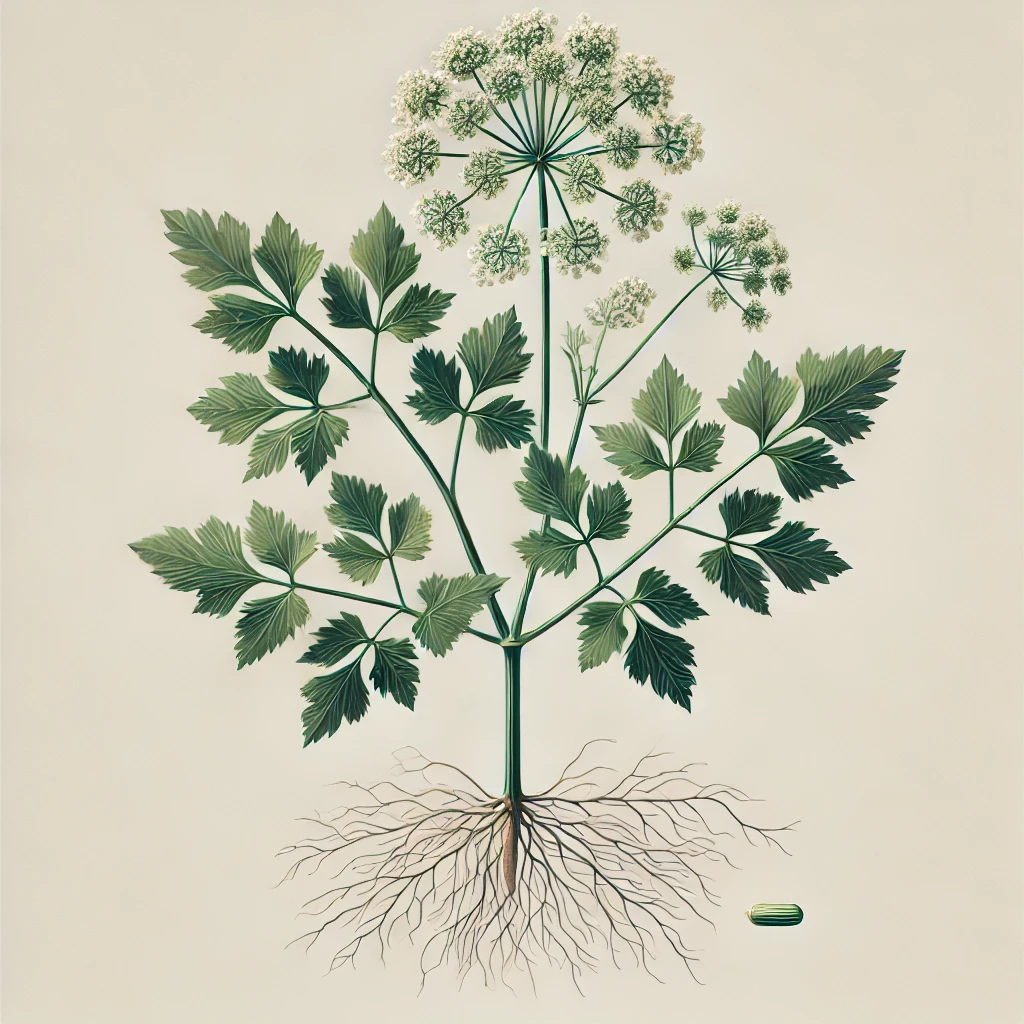 Image 1 of 1
Image 1 of 1


Celery Seed
Celery Seed (Apium graveolens)
Other Common Names: Wild Celery, Ajmoda (Ayurveda)
Family: Apiaceae (Carrot/Parsley)
Parts Used: Seeds
Energetics: Warming, but slightly cooling in some cases (drying)
Taste: Pungent, slightly bitter, earthy
A Potent Botanical for Digestion, Circulation & Joint Health
Celery seed is a versatile herb with both warming and cooling properties, traditionally used in Ayurveda, Traditional Chinese Medicine (TCM), and Western herbalism for supporting digestion, reducing inflammation, and promoting kidney health. Rich in volatile oils, flavonoids, and antioxidants, celery seed is a natural diuretic that supports fluid balance, joint mobility, and cardiovascular function.
Key Benefits & Uses
Celery seed is valued for its diuretic, anti-inflammatory, and carminative properties, making it a trusted botanical for:
✔️ Joint & inflammatory support: Traditionally used to ease arthritis, gout, and muscle pain
✔️ Urinary tract & kidney health: Helps flush toxins and supports healthy kidney function
✔️ Circulatory & heart health: Promotes healthy blood pressure and circulation
✔️ Digestive support: Aids bloating, gas, and sluggish digestion
✔️ Metabolic balance: May assist in regulating blood sugar and fluid retention
✔️ Immune system modulation: Contains antioxidants that support overall vitality
How to Use
🌿 Tea/Infusion: Steep crushed celery seeds for a balancing, detox-supporting tea
🌿 Tincture: A concentrated extract for circulatory and joint health
🌿 Capsules: A convenient option for long-term wellness
🌿 Culinary Use: Adds depth to soups, spice blends, and herbal broths
Energetic Nuance
In Ayurveda, celery seed is seen as warming, making it helpful for kapha and vata constitutions that need digestive stimulation, circulation, and metabolic support.
In Traditional Chinese Medicine (TCM), celery seed is sometimes considered cooling, particularly for conditions of excess heat and dampness, making it useful for urinary tract health, hypertension, and inflammatory conditions like gout.
In Western Herbalism, it is neutral to slightly warming, used primarily for its diuretic and anti-inflammatory actions.
Sustainability & Sourcing
At Soulshine Wellness Co., we ensure our celery seeds are organically and sustainably cultivated, preserving their full aromatic potency while supporting regenerative farming practices.
Safety & Considerations
⚠️ Mild diuretic properties—stay hydrated when consuming regularly
⚠️ Avoid in pregnancy, as celery seed may stimulate uterine contractions
⚠️ May interact with blood-thinning medications—consult a healthcare provider before use
⚠️ Not recommended for individuals with low blood pressure or kidney disorders without professional guidance
Celery Seed (Apium graveolens)
Other Common Names: Wild Celery, Ajmoda (Ayurveda)
Family: Apiaceae (Carrot/Parsley)
Parts Used: Seeds
Energetics: Warming, but slightly cooling in some cases (drying)
Taste: Pungent, slightly bitter, earthy
A Potent Botanical for Digestion, Circulation & Joint Health
Celery seed is a versatile herb with both warming and cooling properties, traditionally used in Ayurveda, Traditional Chinese Medicine (TCM), and Western herbalism for supporting digestion, reducing inflammation, and promoting kidney health. Rich in volatile oils, flavonoids, and antioxidants, celery seed is a natural diuretic that supports fluid balance, joint mobility, and cardiovascular function.
Key Benefits & Uses
Celery seed is valued for its diuretic, anti-inflammatory, and carminative properties, making it a trusted botanical for:
✔️ Joint & inflammatory support: Traditionally used to ease arthritis, gout, and muscle pain
✔️ Urinary tract & kidney health: Helps flush toxins and supports healthy kidney function
✔️ Circulatory & heart health: Promotes healthy blood pressure and circulation
✔️ Digestive support: Aids bloating, gas, and sluggish digestion
✔️ Metabolic balance: May assist in regulating blood sugar and fluid retention
✔️ Immune system modulation: Contains antioxidants that support overall vitality
How to Use
🌿 Tea/Infusion: Steep crushed celery seeds for a balancing, detox-supporting tea
🌿 Tincture: A concentrated extract for circulatory and joint health
🌿 Capsules: A convenient option for long-term wellness
🌿 Culinary Use: Adds depth to soups, spice blends, and herbal broths
Energetic Nuance
In Ayurveda, celery seed is seen as warming, making it helpful for kapha and vata constitutions that need digestive stimulation, circulation, and metabolic support.
In Traditional Chinese Medicine (TCM), celery seed is sometimes considered cooling, particularly for conditions of excess heat and dampness, making it useful for urinary tract health, hypertension, and inflammatory conditions like gout.
In Western Herbalism, it is neutral to slightly warming, used primarily for its diuretic and anti-inflammatory actions.
Sustainability & Sourcing
At Soulshine Wellness Co., we ensure our celery seeds are organically and sustainably cultivated, preserving their full aromatic potency while supporting regenerative farming practices.
Safety & Considerations
⚠️ Mild diuretic properties—stay hydrated when consuming regularly
⚠️ Avoid in pregnancy, as celery seed may stimulate uterine contractions
⚠️ May interact with blood-thinning medications—consult a healthcare provider before use
⚠️ Not recommended for individuals with low blood pressure or kidney disorders without professional guidance





